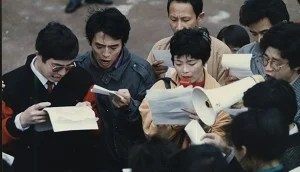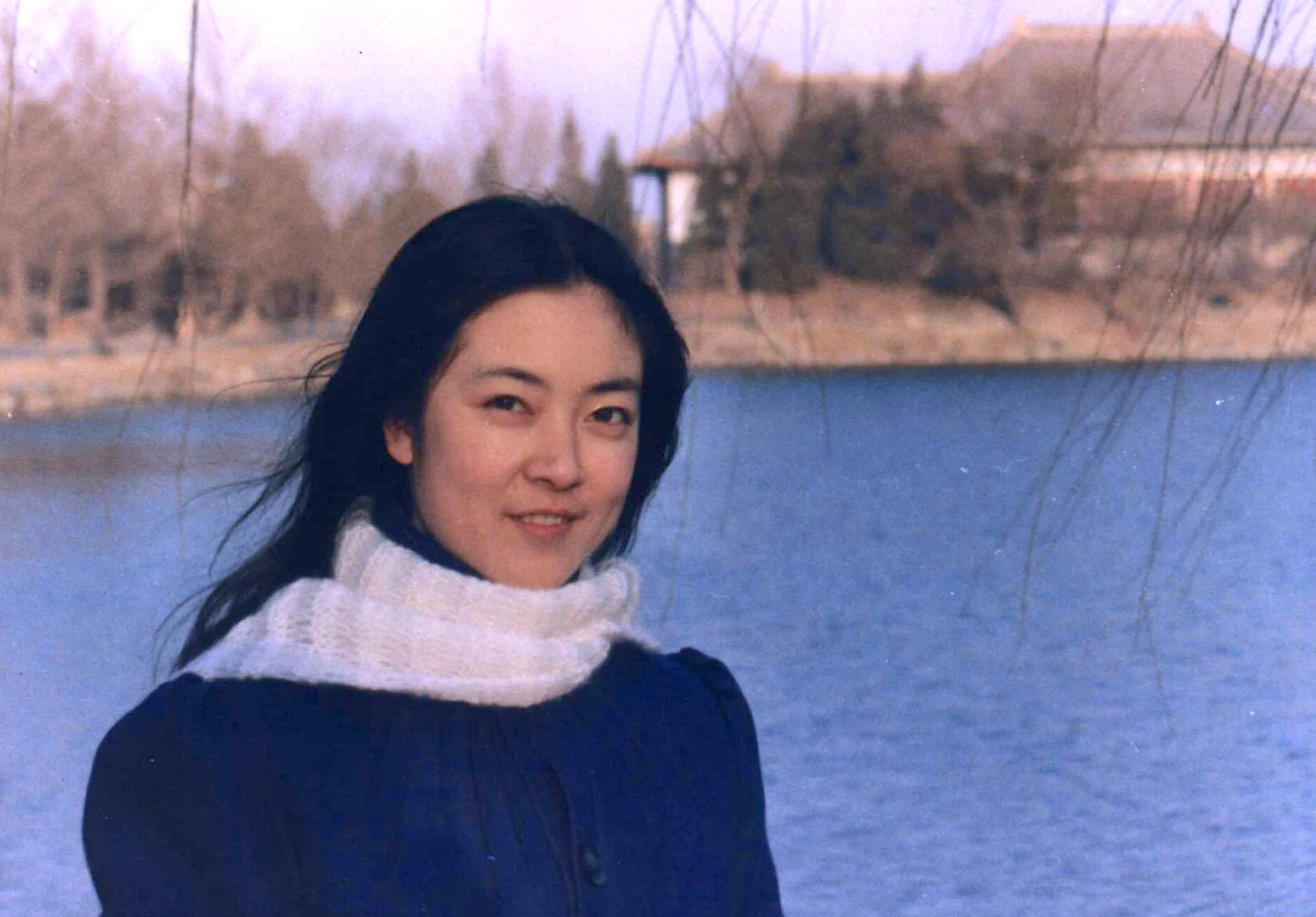Yang Jun–the Man in the Middle of the ''Metal Storm''(Part 1)
By Jennifer Zeng |Special to The Epoch Times | Dec 04, 2006
The first time I saw Yang Jun was at a forum on the Nine Commentaries on the Communist Party in 2005. When he stood up to speak, I could hear whispers in the audience, as though many people there knew him and were talking about him. I didn't know what was special about him, and why he could generate such attention. I asked the people around me and was told, "He was a student leader during the Tiananmen Square Massacre in China. Almost every Chinese person in Sydney knows who he is. He hasn't appeared in public for many years!"
I didn't realize he was a celebrity. Since then, I often saw him at public gatherings or forums, dressed quite formally. Whenever he spoke, he almost always became excited or came to tears. He also called himself an artist.
I had a hard time putting together his two identities of "student movement leader" and "artist." I began to pay more attention to him. Eventually I had a chance to have a long talk with him. His colorful life gave me the inspiration to write about him.
A few months later, I finished interviewing him. Before I began writing, Yang Jun made an announcement on Australian national TV during the 57th anniversary of the establishment of the People's Republic of China. He revealed that the Chinese Communist Party wanted to purchase the Australian weapon technology "Metal Storm" for US$100 million. Again, Yang became the center of attention. He not only refused the US$2 million offer by the CCP to broker the deal, but also disclosed the details to mainstream media. The next day, reports about him appeared on the front page of the newspapers.
Knowing him, I was not surprised by this turn of events. His passion determined that his life would be like a flame, burning fully and brightly.
''Jun, Remember, You Will Always Help Those Who Need Your Help''
Yang Jun was born prematurely in 1956, after only 7 months of pregnancy. His parents were both in the army. Eight months after he was born, he was sent to live with his grandmother in Anguo County, Hebei Province.
Yang Jun's childhood memories revolved around poverty. He grew up during the so-called "Three-Year Natural Disaster" period, which was actually a catastrophe caused by the Great Leap forward movement [1] . On most days his family ate elm leaves mixed with ground corn. This left their stomachs feeling very bloated and uncomfortable. Although there were a few buns hanging from a beam of the house, they were for emergency use only.
When Yang Jun returned to his hometown in Zhangxiang Village, Anguo County, in 2000, he saw that the village was still impoverished.(courtesy of Yang Jun)
Yang Jun remembered that there were often beggars who came by. When he was four or five, an elderly beggar came to the village carrying a worn sac. He had a young child with him. Yang's grandmother didn't say anything and took down the buns they stored for emergency use. She gave away almost all of them to the elderly man. The man and the child knelt down on the ground and said to Yang''''s grandmother, "You are a living Bodhisattva!"
However, Yang's aunt was annoyed that Yang's grandmother had given away their emergency food supply. His Grandmother didn''''t argue. Instead, she held Yang in her arms and said, "Jun, remember, you will always help those who need your help."
Although he was only a young child, Yang Jun remembered those words as though they were etched in his heart. It changed his character forever.
A Beginning in Music
When Yang was eight years old, his parents retired from the military and became civilians. They took Yang to Beijing to attend school. A year later, his grandmother passed away. Yang really wanted to go to her funeral in Hebei Province, since of all his relatives, he was closest to her. But his parents feared the visit would interrupt his studies, and thus did not let him go. He missed his grandmother and cried towards the north in her direction everyday.
At that time, when he was suffering excruciating emotional pains, he heard someone playing the clarinet upstairs. Much later, he learned that it was Dvorak''''s New World Symphony. This was composed when Dvorak was living in America and reflected nostalgia for his home country (today's Czech Republic). Although he was only nine years old and had never studied music, Yang felt that the music had touched his soul deeply. Perhaps because the feelings of nostalgia coincided with the longing for his grandmother.
He felt a wild urge to study and play the clarinet. He thought only by playing the clarinet and joining the New World Symphony would he be able to express his feelings for his grandmother and where he grew up.
His parents were soldiers. Although they lived in an area assigned to the Ministry of Culture, nobody in his family knew music. A famous actor who lived nearby said, "Yang Shuxun's son wants to be a musician? It's like a toad wanting to take a bite off of the swan."
Yang Jun had the same determination for studying the clarinet. When other kids played, he rode his bike to a small patch of trees near Qianmen. The area had a strong stench due to the garbage and sewage piled up from the construction of the subway. He practiced there no matter how hot or cold the weather, often until his lips broke. Because he didn''''t have a teacher, he often rode his bicycle for more than an hour in the winter, from Taoranting to Hepingli, just so he could hear others play from outside the window. Once he stood there for so long that people thought he was a thief, and almost arrested him.
His efforts were not in vain. In 1977, when the universities were restored for the first time since the beginning of the Cultural Revolution [2] , the then "Central May 7 Arts University" [3] was looking for two clarinet students. Yang was one of the two out of several hundred applicants accepted, thus earning the privilege to study under the famous clarinet professor Tao Chunxiao.
Yang Jun playing solo (courtesy of Yang Jun)
After graduation, Yang Jun became the first clarinet player and the leader of the woodwind section of the Ballet Troupe at China's Dance Academy. He was later promoted to the deputy leader of the orchestra. In 1983, he began working for the Chinese Light Music Troupe as a soloist. He was honorably put in the second highest category of national actors.
A Life-Changing Moment
The hall of music was not as pure and sacred as Yang had imagined. It was, unfortunately, also full of conflicts and power games. Having always resented sycophancy, Yang began to contemplate leaving. Coincidentally, the deputy director from a music university in Canberra visited China and agreed to sponsor Yang to study for a Master's degree in music in Australia.
Yang Jun arrived in Australia in March 1989. In April, the Tiananmen Square student movement began in Beijing. Yang organized performances with Li Xiangqin from Hong Kong and some actors from Taiwan to raise funds for the students in Tiananmen Square.
June 4, 1989 was a Sunday. It was pouring rain in Sydney. Yang Jun carried his clarinet and wore a tuxedo. He was ready to perform for another fund raiser. As soon as he walked into Chinatown, he heard the news: The Beijing government had begun a massacre. Tanks rolled into Tiananmen Square and killed civilians and students.
Yang felt blood gushing to his head—his life's journey came to a turning point. He handed his clarinet to the person walking next to him, who he didn't know at all, and picked up a wooden stick. Someone tied a piece of red cloth to the stick. Yang raised the stick, crying, and shouting, "Follow me, all the Chinese with conscience!"
Yang Jun (left) and other student movement leaders read a statement in front of the Chinese consulate in Sydney. (courtesy of Yang Jun)
Yang marched towards the Chinese consulate, leading several thousand Chinese people. The angry mass crushed a column outside of the Chinese consulate. A student who's leg had been broken in the middle of the riot was airlifted. Some people threw eggs and inkbottles at the consulate.
At the gathering of a few thousand people, Yang said, "Before, music was my life and my everything. But the gunshots and tanks crushed my dream of music. The innocent students gave up their lives for China's democracy. From today on, music no longer belongs to me. The movement for China's democratic future is now my life!"
Life in Destitution
From that day on, Yang truly became a full-time student leader. Outside of Hong Kong, Australia probably had the largest demonstrations to support the Tiananmen Square student movement. Sometimes tens of thousands of people attended the activities. The "Chinese Students Democratic Movement Association" in Australia had over 10,000 members, which made it the largest in the world.
A gathering at the Belmore Park in Sydney to support the Beijing student movement (courtesy of Yang Jun)
Yet, it didn''t take long for Yang Jun to realize, "Politics is so indignant." Shortly afterwards, he left the student movement full of emotional scars. By then, he found that he not only spent all the savings he brought from China, but also had closed the door to becoming a professional musician in Australia. As a student movement leader, he saw many Chinese students needed financial assistance. He also donated generously to the victims of the floods in eastern China. As for his future as a musician, because the Australian government has the requirement that no one older than 35 is to be awarded a master''''s degree in music performance, his chances were diminishing as he was already 34. He knew he only had one year left, but did not know where he could find $14,000 to pay for the tuition. During his first year in Australia, he had a full scholarship. But due to the overwhelming number of Chinese students in Australia in 1990, and the amount of time he spent on the student movement, he lost the scholarship.
To make ends meet and pay tuition, he became a doorman at a nightclub. His boss told him that he was hired because he used to be a student movement leader and was well known. By standing at the door in a tuxedo he would attract more patrons.
Yang Jun often told the Chinese students to stop coming to the club to gamble, and his boss yelled at him for driving business away. He, in turn, decided to quit, even though in many people''''s eyes this was an easy job that paid well.
After quitting this job, Yang Jun started washing dishes at a five-star hotel. There were thousands or tens of thousands of dishes, and he needed to wash each one carefully. Everyday he worked until 2 or 3 a.m. Although he worked extremely hard, it was far from being able to pay for schooling.
Once, someone left a broken dish in the sink. Yang Jun was washing the dishes very quickly and suddenly felt a pinch on his pinky. He looked closely and saw that his pinky was slashed all the way to the bone with blood gushing out. Yang Jun heard a ring in his head. He thought to himself, "This is it. My hand is over. My music life is over. My career is over…"
He felt his mind go blank. Like a madman, he threw all the dishes in his hands, squatted on the ground, and started crying. The boss who heard the racquet sent him to the hospital. After he returned, the boss asked him to pay for the dishes, since they were expensive dishes imported from England.
Of course Yang Jun could not afford it. His boss asked, "Why did you throw the dishes when your hand was hurt?" Yang Jun said, "I am a musician. Music is my life. If the music is over, then my life is over. When I saw that my hand was slashed, I didn't want to live anymore."
Yang Ju and Wu Jie (courtesy of Yang Jun)
His boss didn''''t believe him, and said, "What instrument do you play? If you are truly a musician, I will not ask you to pay for the dishes."
The next day, Yang Jun brought his clarinet to the hotel. He played a piece for his boss, and said, "You should know this song by Schubert. When Schubert was in poverty, he wrote this song on a menu just to exchange for a bowl of soup. After his death, this menu sold for 140,000 British pounds."
Yang Jun played another piece by Mozart. Yang Jun said, "Mozart was also in destitution and died at the age of 36. But you cannot hear pain in his music. He was a musician. He suffered great pains but left joy to the world."
The boss was so moved that he became speechless. He immediately gave Yang Jun a very easy job: collect money at the cash register and distribute plates. In addition to work, Yang had more free time to read books. It was also during this period that Yang met Ms. Wu Jie, who also worked at the hotel, and who he later married.
End of Part 1
[1] The Great Leap Forward (1958 – 1960) was a campaign by the CCP to jump-start China''''s industries, particularly the steel industry. It is widely seen as a major economic disaster.
[2] Around the early 1970s, during the Cultural Revolution (1966 – 1976), the traditional higher education system was abandoned and universities in China only accepted few students—who were called worker-peasant-soldier students—without the need of taking an entrance examination. After 1977, the higher education system was restored, and universities started to enroll new students with an entrance examination once again.
[3] During the Cultural Revolution (1966 – 1976), Jiang Qing, the third wife of Mao Zedong, decided to merge all the art schools in Beijing into one university named "Central May 7 Arts University".









